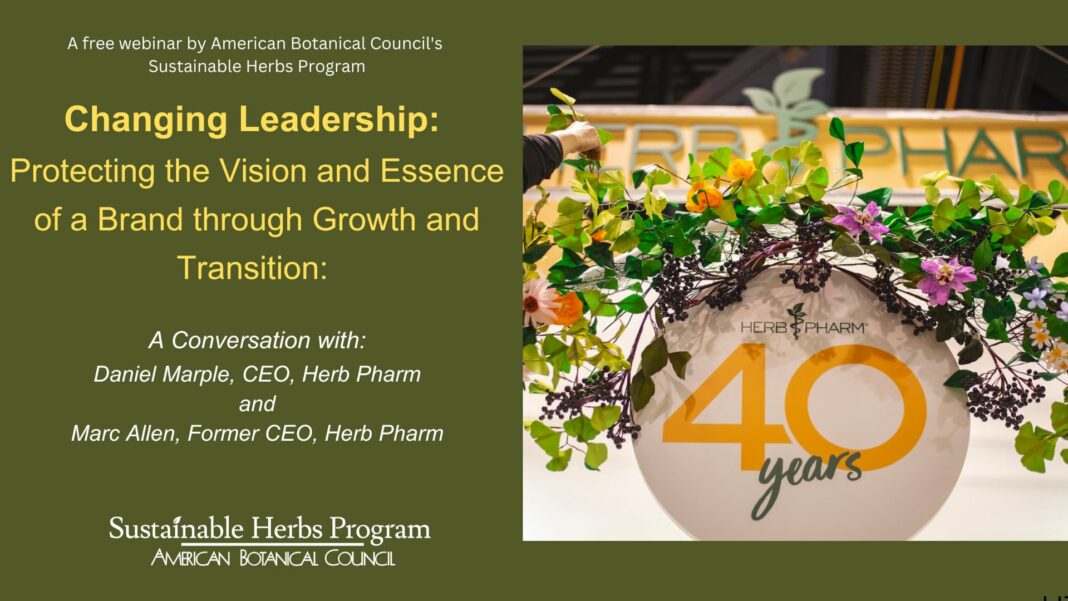A Conversation with Marc Allen, previous CEO of Herb Pharm, and Daniel Marple, current CEO, Herb Pharm
by Ann Armbrecht, SHP Director
Herb Industry at Pivotal Moment
When we spoke in preparation for the webinar, Marc Allen said that it is a pivotal moment in the herb industry right now. Most of the founders of those early herb companies will have to sell in the next 5-10 years. How and to whom these founders sell will determine the future of this segment of the natural products industry.
Will plants and the values of herbalism still be part of the conversation? What are some key things to think about as these companies navigate these changes? And what can we, as supporters of these legacy brands, do to help?
We had a wonderful conversation. Here is the complete recording:
Highlights
Below are a few highlights from the conversation. I encourage you to watch the entire recording though, because Marc and Daniel go into more details about what it means to be part of a mission-driven herb company.
Choosing a partner
So many things stood out to me from this conversation. I was struck by the intention and attention that has gone into the transitions at Herb Pharm. Marc handled two sales of the company. The second time around, he was looking for a buyer with a longer horizon because the more ownership transitions you have, the more likely the original vision and mission will be diluted. You need to put in a lot of time, he said, to find a way “to understand at what level people can act with purpose not just for profit.”
He looked for where buyers didn’t understand or weren’t interested in the purpose side of things, which he found by seeing the questions they asked and those they didn’t ask. Of course it is important to have business meetings. But it is also important to meet with people socially over a period of time, he said. “Eventually, things either get displayed or they don’t get displayed and that will tell you about the purpose piece, which is the very special piece, and whether they will be a fit or not,” Marc said.
“Having a partner that doesn’t blink, who, when there are downturns, doesn’t ask you to make different kinds of decisions and is willing to work through and ride the inevitable ups and downs of any organization makes a big difference. The care that goes into selecting your partner can’t be overstated. Without a doubt,” he added.
How to grow with integrity?
Marc said that sometimes people can confuse growth with making leaps that aren’t appropriate for herbal medicines, and so growth can be seen as a bad word. When Ed and Sara said they weren’t looking to grow for the sake of growth, “They were saying that they wanted whatever happened to not dilute the sense of community, not dilute the quality of what was provided for folks. And that was really the watch out: ‘We’re not asking you to do things that would conflict with the values and ethics that we have put in place here.’ And that’s what they really meant.
“In other words, don’t go rushing out and offer products that that aren’t consistent with our vision of what we should be doing. Don’t be sprinkling herbs on a carbonated sugar drink. That’s not us.”
And Daniel added, “Growing with integrity comes down to quality and sustainability.” In thinking about growth, he needs to protect the quality they aspire to and he needs to protect their commitment to Mother Nature. He sees himself as an advocate for the organization and a protector of its mission and values moving forward.
Importance of Herbalism
Marc created an Herbal Charter for Daniel, a document in the spirit of the letter from the President to the President elect. The charter included six areas that come down to education and research: how are they continuing to advance the industry’s knowledge and how are they educating their employees? Passion for herbs is an important part of the company, Daniel explained. As is sustainability and their commitment to the environment. “We take care of plants so they can take care of people and you can only take care of plants through a sustainability commitment.” Finally, an herbalist is on the leadership team and has an equal say in the strategic direction because the integrity of the company relies on that input. “Without a head of herbal affairs we fly blind,” Daniel said.
Balancing the Short and Long Term
Daniel mentioned their investment in Regenerative Organic Certification as an example of choosing to take the harder path because of its long term importance. “I have a huge amount of respect and appreciation for our Quality and Agriculture team that chose to take that on at a time when we didn’t necessarily have to. And so what I mean by growing with integrity means that you have to make some of the tougher decisions and invest in the future. And that means you don’t necessarily get the short term realization of that benefit. But it’s the right thing to do. And it ensures that you are not cleaning up a mess that can sometimes be a lot more costly down the road.
So, we take more of a proactive approach to the quality of our growth. We try to find ways to improve ourselves moving forward. And that means that we’re focused on longer term sustainable growth as opposed to the short term.”
In response to a question of whether there was a playbook or guide for forming a mission driven company, Daniel answered, “Well, I mean, you can’t fake it. You learn about integrity through actions versus words. A lot of people are throwing out terms and linking themselves to behaviors that they’re not necessarily following up on… Creating a company like Herb Pharm doesn’t have a playbook because, if it did, it wouldn’t be genuine. I know for a fact that Ed and Sara didn’t envision where we are today. But what they created was founded on that principle of taking care of the community through herbs and taking care of the planet through herbs.”
Key Performance Indicators (KPIs) and Metrics
Marc later shared his response to a question he wasn’t able to get to in the webinar itself: What metrics/KPIs were agreed upon through the transition, if any, that may directly reflect the mission/purpose and other core purpose-driven measures of integrity?
“We did not write KPI’s for our transitions. In addition to the normal legal and financial due diligence process we carefully made all the differences in Herb Pharm’s legacy practices explicit and asked for and received a commitment to honor and maintain them.
This included everything from better than market compensation and benefits for employees, to paying whatever was required to source, grow and process the quality level herbs we required, to assuring herbalists had a decisive role in all decision making and to only offering products that would never include unhealthy ingredients or additives, and that claims would be responsible and fully meet the threshold for herbal integrity. In other words, ensuring buy-in to engagement with a truly holistic, purpose driven organization, not just a standard business transaction.”
Caring for the Plants in Nature
At the end or our conversation Marc said, “As excited as Ed and Sara were about herbal medicines, ultimately it was about the plants in nature and our Earth and recognizing that herbal medicine is a way of experiencing that and connecting with those things.”
Related


